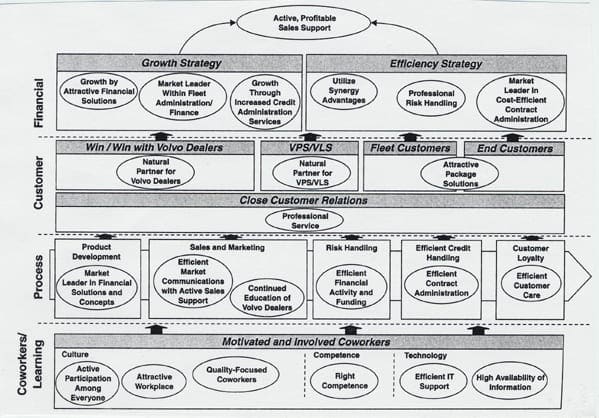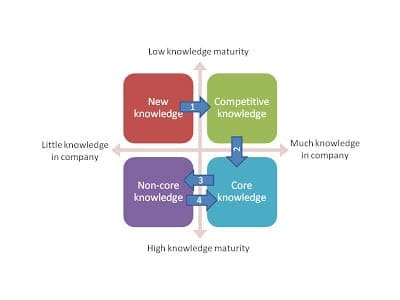
Favorite Why search for what’s new? Why not search for what we know works? Image from wikimedia commons Rolf Dobelli in his book “The Art of Thinking Clearly“, and Nassim Nicolas Taleb in “Antifragile“, refer to the term Neomania. Taleb defines Neomania as follows “The “love of the modern for
Read More
 Shared by Nick Milton August 1, 2018
Shared by Nick Milton August 1, 2018

Favorite In another reprise from the archives, here’s a post about that useful tool, the KM strategy map You know I am a firm believer in business led Knowledge Management Strategy. At a meeting yesterday, I saw this presented in a very striking and visual way, through the use of a
Read More
 Shared by Nick Milton June 29, 2018
Shared by Nick Milton June 29, 2018

Favorite This a a reprise of a post from 5 years ago, describing a useful matrux for plotting your strategic knowledge topics. I first described this matrix in this article in KM review in 2007, as a tool which can be useful in developing your KM strategy. This Boston Square-style
Read More
 Shared by Nick Milton February 19, 2018
Shared by Nick Milton February 19, 2018

Favorite The Connect and Collect approaches in KM are like the left leg and the right leg- you need to use both. image from PublicDomain Pictures I was working with a client last week who is very interested and enthused about the use of Knowledge Management Processes to drive conversations
Read More
 Shared by Nick Milton February 12, 2018
Shared by Nick Milton February 12, 2018

Favorite It is a strange, troubling, but apparently true fact that 85% of KM initatives have no stated objective. Image from wikimedia commons This statistic comes from Page 7 of this presentation by Bob Armacost, and quotes the results of a survey run by KPMG 80% of companies in a recent
Read More
 Shared by Nick Milton August 31, 2017
Shared by Nick Milton August 31, 2017

Favorite Complex organisations may be involved in more than one type of activity, and may need more than one KM strategy and framework. Two of the early activities in any Knowledge Management implementation are to develop a Knowledge Management Strategy (as we discussed yesterday), and start to map out a potential
Read More
 Shared by Nick Milton August 11, 2017
Shared by Nick Milton August 11, 2017

Favorite You need a strategy if your KM implementation is to be successful. Here are 8 reasons why. Implementing Knowledge Management without a strategy is a risky endeavour. As Sun Tzu is reputed to have said said, in “the art of war”, “Strategy without tactics is the slowest route to victory.
Read More
 Shared by Nick Milton August 10, 2017
Shared by Nick Milton August 10, 2017
Favorite The demographics of your organisation determine the distribution of knowledge, and therefore the Knowledge Management Framework Here’s another factor that can affect the way you address KM in an organisation; the demographics of the workforce. Because the demographics are is linked to the distribution of knowledge across the staff,
Read More
 Shared by Nick Milton July 27, 2017
Shared by Nick Milton July 27, 2017
Favorite There is one really big risk to the knowledge manager which can strike you at any time, but it is a risk you can protect against. Photo from maxpixel.freegreatpicture.com A couple of weeks ago at the KMUK conference we heard some scary stories from knowledge managers who had lost
Read More
 Shared by Nick Milton June 29, 2017
Shared by Nick Milton June 29, 2017

Favorite We tend to divide Knowledge Management into opposing categories. Sometimes this is useful, but often this dualism is illusory. Image from wikimedia commons Dualism is the idea that, for some particular domain, there are two fundamental kinds or categories of things or principles. It is an “either-or” mindset, which
Read More
 Shared by Nick Milton June 20, 2017
Shared by Nick Milton June 20, 2017
![]() Shared by Nick Milton August 1, 2018
Shared by Nick Milton August 1, 2018







